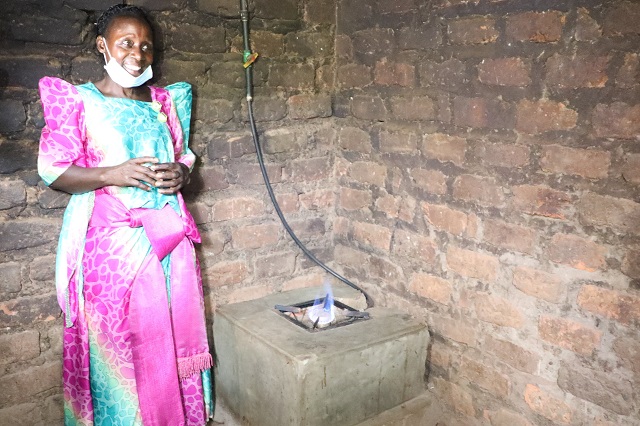
Kalungu, Uganda | THE INDEPENDENT | Joys Bazanye Nazziwa, a resident of Bukulula sub county, Kalungu district, no longer worries about preparing meals for her family.
“I used to spend at least Shs 4,000 per day to buy firewood to prepare meals for my nine-member family,” she told The Independent in an interview on May 5.
“But that is no more. The money I used to spend on firewood is now used to buy some beef for my family as well as books for my school going children.”
Nazziwa said she also no longer cuts the available trees as wood fuel and that she uses the animal sludge as fertilizer in the banana and coffee plantations.
Nazziwa’s household is just one of the tens of households that have received the cow dung powered biogas and more expected in few days ahead as part of the Food and Agriculture Organization’s initiative to provide clean and labour saving energy technologies for gender responsive transformation and climate change mitigation in the Central Cattle Corridor, by turning agricultural residue and waste into clean energy.
Through the Global Climate Change+ Project, funded by the European Union, FAO plans to establish 96 flexi biogas systems in the Central Cattle Corridor Districts of Nakasongola, Luwero, Nakaseke, Mubende, Kiboga, Sembabule, Lyandote, Kalungu and Gomba.
Antonio Querido, a representative of FAO in Uganda, said the organization is impressed that thetechnology is improving people’s lives.
“This system will help to not only save trees as firewood but also preserve the environment,” he said.
“This is also the only way to engage men to participate in home chaos such as feeding the cows.”Querido said there’s also need to look into how the technology can be scaled up for the benefit of alarger community.
This development comes at the time the available statistics shows that Uganda’s forest has cover plummeted from 24% of its area in 1990 to 9% in 2015 and that it forest cover loss has increased to an estimated 200,000 hectares annually.
Vincent Ssempijja, the Minister for Agriculture, Animal Industries and Fisheries said the new technology has demonstrated it works more efficiently and that it can be used to conserve the environment. He, however, said the population need to be educated more about the technology for easy adoption.
 The Independent Uganda: You get the Truth we Pay the Price
The Independent Uganda: You get the Truth we Pay the Price





